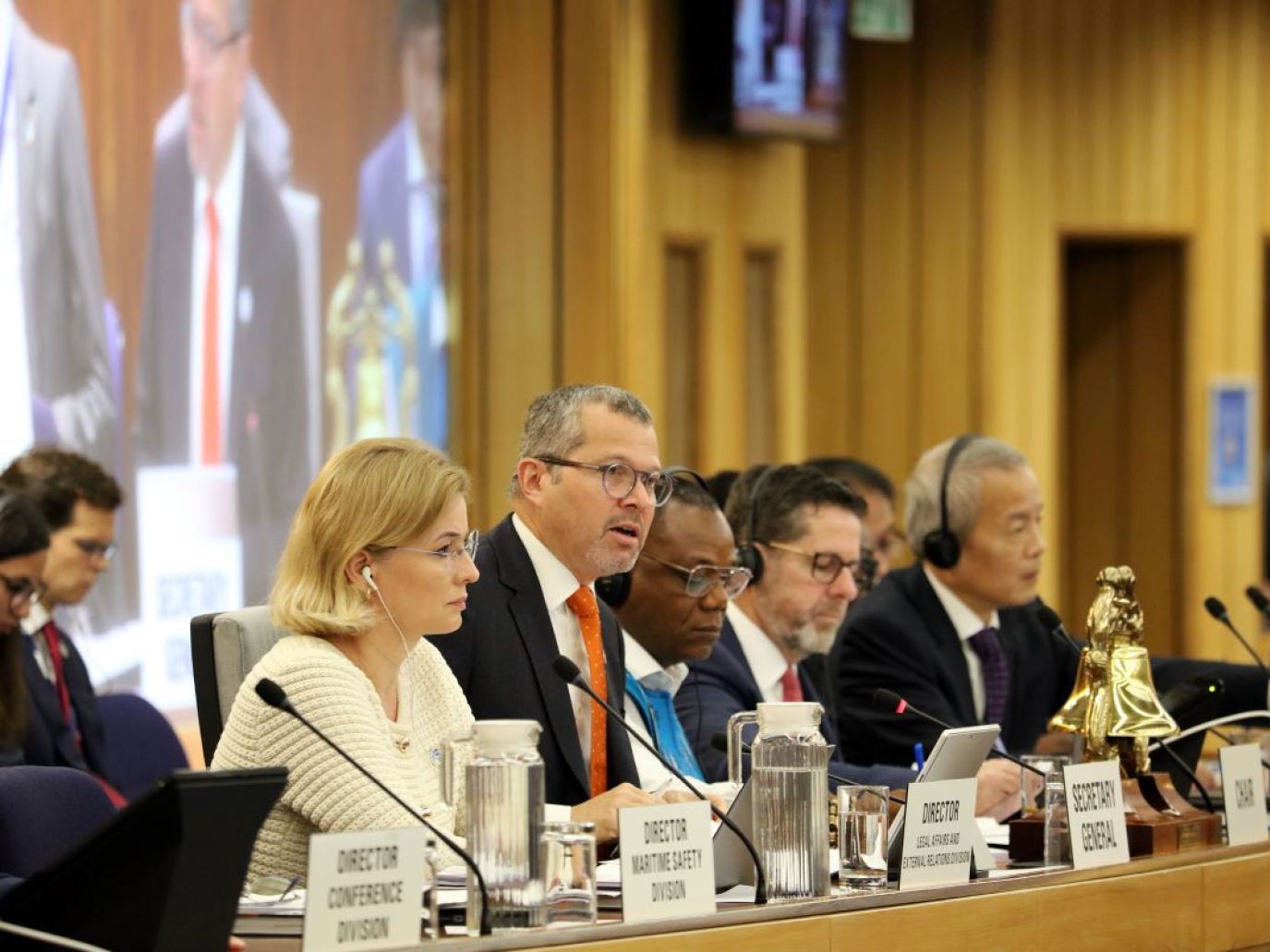The Net Zero Framework (NZF) is the International Maritime Organisation's (IMO) plan for decarbonising the maritime transport sector, aimed at reducing greenhouse gas emissions by 20-30% by 2020 and achieving net-zero emissions by 2050.
Tentatively approved last April with 63 states in favour and 16 against, the NZF was due to be formally adopted yesterday, Friday 17 October, on the last day of the second extraordinary session of the Marine Environment Protection Committee (MEPC/ES.2), opened on 14 October at the IMO headquarters in London.
Yet the United States, with the support of Saudi Arabia, the United Arab Emirates, Singapore and other countries, managed to prevent its adoption through threats and an attempt to change the procedural rules, which, if passed, could have proved to be a trap that would have effectively blocked its adoption indefinitely.
Throughout the week, the most important flag states, those with the largest number of registered ships and which transport the largest quantities of goods, remained silent. However, according to Lloyd's List, the states representing well over 50% of global tonnage have changed their position since April. At that time, they were in favour of adopting the NZF. Now, many have decided to abstain or vote against its adoption. The IMO meeting therefore ended with 57 states in favour (49 against) of postponing the vote on the adoption of the NZF until next year.
Threats and attempts to change procedural rules
In the months and weeks leading up to the meeting, the United States threatened tariffs and retaliation against countries that supported the plan. On 10 October, in a joint statement, Secretary of State Marco Rubio, Secretary of Energy Chris Wright and Secretary of Transport Sean Duffy reiterated the threats, and indicated that the United States was prepared to take retaliatory measures against officials from the various states. Retaliation could include blocking ships flying the flags of those countries in US ports, placing restrictions and fees on visas, and imposing sanctions on officials who, according to Rubio and Duffy, “support climate policies promoted by activists.”
As reported by Lloyd's List, the United States has also sought to block the adoption of the Net Zero Framework by proposing a change to the procedural rules, calling for a shift from “tacit” to “explicit” acceptance, which would make it easier to block the plan.
Since 1973, the decision-making system within the IMO has been one of tacit acceptance: that is, an amendment to the MARPOL Convention enters into force 10 months after its formal adoption by the MEPC, unless one-third of the parties to the MARPOL Convention, or countries representing 50% of the world's gross tonnage, object.
Explicit acceptance, on the other hand, requires that after formal adoption, at least two-thirds of the contracting governments must write to the IMO to confirm their acceptance. As reported on the IMO website, the explicit acceptance process “is time-consuming and most amendments adopted in this way have never entered into force”. The Net Zero Framework was developed with the tacit acceptance system in mind, and switching to explicit acceptance at this stage of the process would effectively ensure that it would never enter into force.
Most countries, led by Denmark, Canada, Australia, Kenya and some EU states, urged the MEPC to maintain tacit acceptance. Brazil, which will host COP30 on climate change in December, defended the NZF and tacit acceptance, accusing the United States of threatening multilateralism, condemning the use of “methods that should never be used between sovereign nations” and adding that “we hope this will not replace negotiations as the normal way of making decisions.”
India also defended implicit acceptance, while, according to Lloyd's List, China's position was more ambiguous, as on Tuesday it expressed support for the NZF but on Wednesday seemed to lean towards explicit acceptance.
On Friday, Singapore, previously in favour of the NZF, proposed that nations postpone the vote until next year. The proposal was supported by Saudi Arabia, which, along with other fossil fuel-producing countries, has opposed the Net Zero Framework since the beginning of the discussions.
The European Union has split
The European Union normally votes as a united front at the IMO and, in the case of a vote on the adoption of the NZF, should have supported it with a yes vote. However, according to observers, three of its major maritime states, Greece, Cyprus and Malta, were considering abstaining from the vote during the week. This news was later debunked by Malta.
Yet, during the vote on Singapore's motion to postpone the vote on the adoption of the NZF until next year, according to Lloyds List, Greece and Cyprus abstained, violating EU rules and reflecting the strong concerns of their maritime industries about the increased costs of using fossil fuels.
“Crucially, the EU must continue to strengthen its own green shipping ambitions and retain its own maritime policies which now stand as the only substantive regulations to tackle shipping emissions in the void left by the IMO NZF,” said the NGO Transport & Environment in a press release after the meeting, according to which “Bold regional action is still possible with or without the US.”
Reactions from NGOs and observers
“Adoption through explicit ratification of the current amendments leads to delays and prolonged uncertainty that could last for years or decades,” warned the World Shipping Council, pointing out that this kind of uncertainty is what prevents shipping companies from making the green investments needed to achieve the IMO’s decarbonisation goal.
“By delaying adoption of its Net Zero Framework, IMO has today squandered an important opportunity to tackle global shipping's contribution to climate breakdown,” claimed John Maggs, representative of the Clean Shipping Coalition at the IMO. “However, all is not lost – not by a long shot, as there is an immediate opportunity to slash GHG emissions from shipping, minimise fuel burn and the overall cost of the energy transition and that is to strengthen and make enforceable the Carbon Intensity Indicator (CII), the IMO’s cornerstone energy efficiency measure. There's no time to waste, at MEPC 84 April 2026 member states need to focus all their attention on transforming the CII into the energy efficiency powerhouse needed to quickly right this ship and put it back on route to being a climate solution.”
“The collapse of MEPC talks and the one-year delay in adopting IMO’s Net Zero Framework aren’t just procedural, we all know they’re political,” said Eman Abdalla, Strategic Advisor in the Global Maritime and Supply Chain, on the outcome of the meeting. “What’s at stake isn’t the headline target for 2050, it’s the credibility of the transition itself. The more we delay operational, scalable measures, the more we will pay later; financially and environmentally. Leadership in shipping must now shift from conference rooms to companies, cargo owners, and financiers who can move faster than politicians.”
“Although the Net-Zero framework is far from perfect, its adoption would have been an important step in maintaining the IMO’s commitment and in sending important signals to an industry that not only demanded a global framework but actively supported this agreement,” Maggs added.
According to Bloomberg, the delay in voting could represent a setback for climate diplomacy and multilateral environmental regulations ahead of next month's COP30 climate summit in Brazil.
“We are not conducting climate negotiations here, but geopolitical negotiations,” said Faig Abbasov, director of the maritime sector at the NGO Transport & Environment, speaking from the sidelines of the talks. “The United States is waging war on multilateralism, UN diplomacy and climate diplomacy, at this meeting, inside the building and outside.”
“The delay leaves the shipping sector drifting in uncertainty. But this week has also shown that there is a clear desire to clean up the shipping industry, even in the face of US bullying”, added Alison Shaw, IMO manager at Transport & Environment. “The world cannot let intimidation and vested interests dictate the pace of climate action. Climate-ambitious countries must use this moment to build a strong majority in support of meaningful decarbonisation. They will be the ones that benefit from the economy of tomorrow, not the geopolitical power games of the past.”
What is going to happen now?
It is unclear what the diplomatic consequences of the postponement will be on the vote for the Net Zero Framework. Will pressure from the United States and other fossil fuel-producing countries succeed in further weakening the work of countries in favour of decarbonising maritime transport over the next year? Or will the European Union and other states in favour of the NZF be able to find alternative ways forward?
And what influence will the United States' threats to not only states, but also their officials have? Will they be intimidated after seeing the results of US sanctions against the UN rapporteur for human rights in the occupied Palestinian territories, Francesca Albanese, who cannot even open a bank account or carry out financial transactions in any country?
And what to make of the suggestion from Australian billionaire Andrew Forrest, advocate of stricter global regulations to halt climate change, who sent IMO delegates a letter stating that he is “ready to support any country or individual being blackmailed or threatened”? “You are not alone,” Forrest added. “I am committed to working with others to ensure that justice prevails and bullying tactics do not win out.” Are we really in a world where sovereign states need to be protected by billionaires in order to develop regulations against climate change?
Cover: Opening of the IMO Marine Environment Protection Committee (MEPC) 2nd extraordinary session, 14-17 October, 2025, via Flickr



